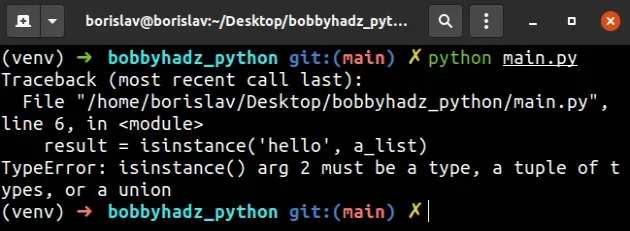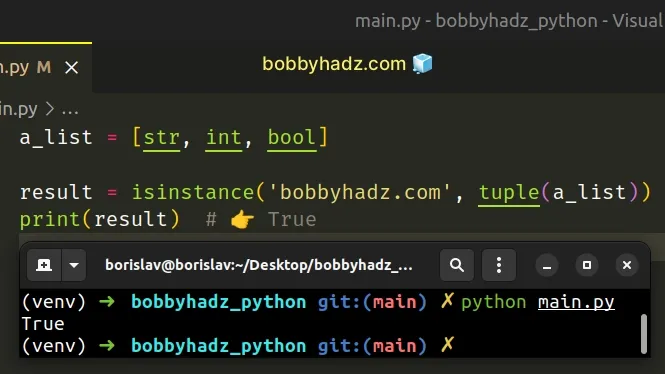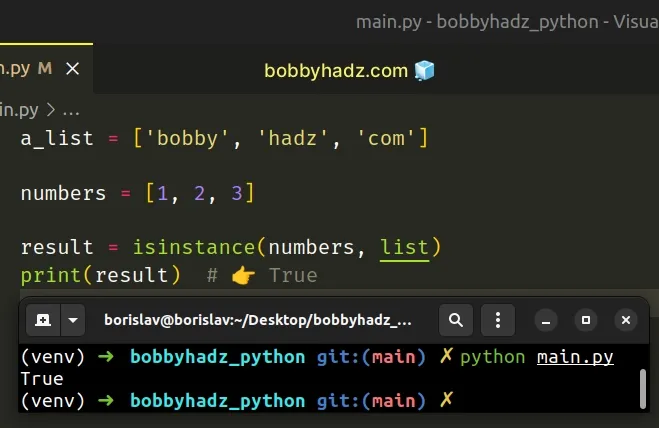TypeError: isinstance() arg 2 must be a type, tuple of types, or a union
Last updated: Apr 10, 2024
Reading time·3 min

# TypeError: isinstance() arg 2 must be a type, tuple of types, or a union
The "TypeError: isinstance() arg 2 must be a type, a tuple of types, or a union" occurs for 2 main reasons:
- Passing a list instead of a tuple when checking if an object is a subclass of one of multiple classes.
- Shadowing a built-in class by declaring a variable with the same name, e.g.
list.

# Passing a list instead of a tuple to isinstance()
Here is an example of how the error occurs.
a_list = [str, int, bool] # ⛔️ TypeError: isinstance() arg 2 must be a type, a tuple of types, or a union result = isinstance('bobbyhadz.com', a_list)
We passed a list as the second argument to the isinstance() function which
caused the error.
The isinstance function can either be passed a class or a tuple of classes.
# Pass a tuple to the isinstance() function
You can use the tuple() class to convert the list to a tuple if you are trying to check if an object is an instance of one of multiple classes.
a_list = [str, int, bool] result = isinstance('bobbyhadz.com', tuple(a_list)) print(result) # 👉️ True

The isinstance() function
returns True if the passed-in object is an instance or a subclass of the
passed-in class or at least one of the classes in a tuple.
# Shadowing built-in classes
The error is also caused if you shadow a built-in class by declaring a variable with the same name.
# 👇️ This shadows the built-in list class list = ['bobby', 'hadz', 'com'] numbers = [1, 2, 3] # ⛔️ TypeError: isinstance() arg 2 must be a type, a tuple of types, or a union result = isinstance(numbers, list)
We declared a variable named list which shadows the built-in list class.
isinstance() function rather than the built-in list class.# Rename the variable to solve the error
To solve the error, rename the variable in your code.
a_list = ['bobby', 'hadz', 'com'] numbers = [1, 2, 3] result = isinstance(numbers, list) print(result) # 👉️ True

We renamed the variable to a_list, so it no longer shadows the built-in list
class.
# Use the type() class to get around the error
If you aren't able to rename the variable, use the type() class.
list = ['bobby', 'hadz', 'com'] numbers = [1, 2, 3] result = isinstance(numbers, type(list)) print(result) # 👉️ True
The type class returns the type of an object.
print(type(['bobby', 'hadz', 'com'])) # 👉️ <class 'list'> print(type('bobbyhadz.com')) # 👉️ <class 'str'>
Most commonly the return value is the same as accessing the __class__
attribute on the object.
You can also pass an object of the correct type to the type() class, it
doesn't have to be the variable that shadows the built-in class.
list = ['bobby', 'hadz', 'com'] numbers = [1, 2, 3] result = isinstance(numbers, type([])) print(result) # 👉️ True
However, the best solution is to rename the variable in your code to something that doesn't shadow a built-in Python class.
# Conclusion
To solve the "TypeError: isinstance() arg 2 must be a type, a tuple of types, or a union":
- Make sure to only pass a class or a tuple of classes as the second argument.
to the
isinstance()function. - Make sure to not shadow built-in classes by declaring a variable with the same name.
# Additional Resources
You can learn more about the related topics by checking out the following tutorials:
- Creating class instances from a Dictionary in Python
- How to get the File path of a Class in Python
- Creating class instances from a Dictionary in Python
- How to Create an incremental ID in a Class in Python
- Convert a string to a Class object in Python
- Purpose of 'return self' from a class method in Python
- Call a class method from another Class in Python
- How to access Parent class Attributes in Python
- Error: filename.whl is not supported wheel on this platform

